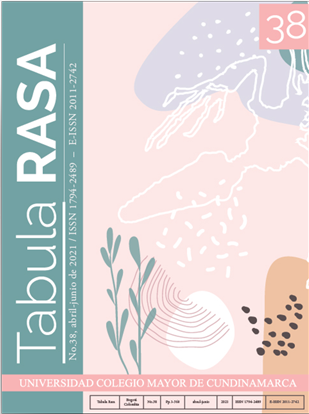Conexiones coloniales.
Colonial connections.
Mostrar biografía de los autores
Este breve artículo aborda en cuatro temas la forma en como tres imperios (chino, español, y británico) y los distintos procesos de colonización ibéricos y británicos se entrelazaron históricamente. Tomando el método de análisis comparativo en relación de Shu-mei Shih, se analiza brevemente lo siguiente: 1) la historia revisionista antieurocéntrica que suele incluir a Asia, pero excluye a Abya Yala de la historia universal; 2) la exclusión de los imperios ibéricos de las versiones convencionales sobre los imperios y la historia contemporánea universal, incluidas las teorías literarias poscoloniales; 3) la separación artificial de los imperios ibérico y británico y sus colonias en el llamado Nuevo Mundo; y 4) la colonialidad de la democracia o la expulsión de los colonizados del sistema de gobierno.
Visitas del artículo 99 | Visitas PDF 85
Descargas
- Cañizares-Esguerra, J. (2006). Puritan conquistadors: Iberianizing the Atlantic, 1550–1700. Palo Alto: Stanford University Press.
- Fernández-Armesto, F. (2003). The Americas: A hemispheric history. New York: Modern Library Edition.
- Grosfoguel, R. (2012). El concepto de «racismo» en Michel Foucault y Frantz Fanon: ¿Teorizar desde la zona del ser o desde la zona del no-ser? Tabula Rasa, 16, 79–102. https://doi.org/10.25058/20112742.112
- Frank, A. G. (1998). ReORIENT: Global economy in the Asian age. Berkeley: University of California Press. https://doi.org/10.1525/9780520921313
- Hobson, J. M. (2012). The Eurocentric conception of world history: Western international theory, 1760–2010. Cambridge: Cambridge University Press. https://doi.org/10.1017/CBO9781139096829
- Hobson, J. M. (2004). The Eastern origins of Western civilisation. Cambridge University Press. https://doi.org/10.1017/CBO9780511489013
- Keating, C. (2011). Decolonizing democracy. Transforming the social contract in India. State College: Pennsylvania State University Press.
- Lugones, M. (2010, otoño), Toward a decolonial feminism. Hypatia, 25(4), 742–759. https://doi.org/10.1111/j.1527-2001.2010.01137.x
- Lugones, M. (2007, invierno). Heterosexualism and the colonial/modern gender system. Hypatia, 22(1), 186–219. https://doi.org/10.1353/hyp.2006.0067
- Mann, C. C. (2012). 1493: Uncovering the New World Columbus created. New York: Vintage Books.
- McMahon, D. M. (2004). The other transatlantic tie: The Hispanosphere. Orbis, 48(4), 657–672. https://doi.org/10.1016/j.orbis.2004.07.007
- Mendoza, B. (2016). Coloniality of Gender and Power: From Postcoloniality to Decoloniality. En L. Dish & M. Hawkesworth (Eds.). The Oxford Handbook of Feminist Theory. Oxford: Oxford University Press. https://doi.org/10.1093/oxfordhb/9780199328581.013.6
- Mendoza, B. (2007, otoño-invierno). Juxtaposing lives: Mary Wollstonecraft and Sor Juana Inés de la Cruz. Women’s Studies Quarterly, Special Issue on Activisms, 35(3-4), 287–291. https://www.jstor.org/stable/27649716
- Mendoza, B. (2006). The undemocratic foundations of democracy: An enunciation from Postoccidental Latin America. Signs: Journal of Women in Culture and Society, 31(4), 932–939. https://doi.org/10.1086/500607
- Nichols, R. (2005). Realizing the social contract: The case of colonialism and the Indigenous peoples Contemporary Political Theory, 4(1), 42–62. https://doi.org/10.1057/palgrave.cpt.9300153
- Pomeranz, K. (2000). The great divergence: China, Europe, and the making of the modern world economy. Princeton NJ: Princeton University Press. https://doi.org/10.1515/9781400823499
- Pomeranz, K. & Topik, S. (1999). The world that trade created: Society, culture, and the world economy, 1400–the present. New York: M. E. Sharpe.
- Shih, S.-M. (2015). World studies and relational comparison, PMLA, 130(2), 430–438. https://doi.org/10.1632/pmla.2015.130.2.430
- Weber, M. (1930). The Protestant ethic and the spirit of capitalism (reimpresión de 1905). Crows Nest: George Allen and Unwin.








